This content was published: February 16, 2015. Phone numbers, email addresses, and other information may have changed.
Gandhi Principles: Grandson imparts lessons from a legendary leader
Photos and Story by James Hill
Even Arun Gandhi couldn’t get an autograph from his influential grandfather – Mohandas K. “Mahatma” Gandhi.
As a child in the 1940s, during the height of his granddad’s popularity, Arun had trouble getting a signature from Gandhi, who charged a rupee for his autograph at the time. He wouldn’t give Arun one for free and told him he had to work for it. It was all part of Gandhi teaching his grandson values and that just because you are part of his family doesn’t mean you are handed anything.
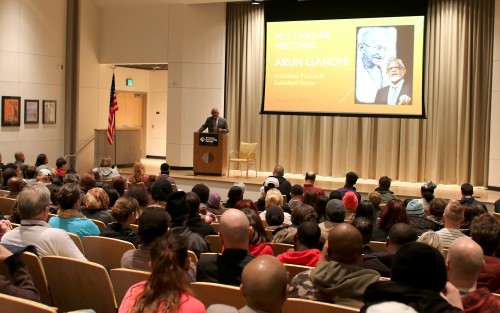
Arun Gandhi is the fifth grandson of India’s legendary leader and he took time on a busy book tour to stop by PCC on Jan. 22. His presentation, ‘Teaching Peace in Turbulent Times,’ attracted more than 200 staff, faculty and students.
This philosophy included cleaning of toilets buckets at Gandhi’s ashram, a job which typically were done by the low caste Dalits, or known as “Untouchables.” It was nothing new for Gandhi, who once made a man who had earned a doctorate from the London School of Economics clean his toilets after offering an idea that would change the Indian economy. The elder Gandhi considered that act to be just as important as changing the economy of the country and when the man finished the job he gave his blessings on the economic plan.
“My grandfather wanted us to learn that there is no caste system,” Arun told the packed audience in the Moriarty Arts and Humanities Building at the Cascade Campus. “Any work that needs to be done has to be done by whoever is available. We should not wait for a caste person to come and clean the buckets. It was a way for him to teach us simplicity and break down barriers that existed between people.”
Arun Gandhi is the fifth grandson of India’s legendary leader and he took time on a busy book tour to stop by PCC on Jan. 22. His presentation, “Teaching Peace in Turbulent Times,” attracted more than 200 staff, faculty and students. Gandhi travels the world teaching peace and nonviolence through education and writes a popular blog for the Washington Post. He is the founder of M. K. Gandhi Institute for Nonviolence in New York and is the recipient of numerous awards and honorary degrees for his work on peace and reconciliation.
Gandhi was born in 1934, in Durban, South Africa. He grew up under the discriminatory apartheid laws of South Africa, beaten by white South Africans for being too black and by black South Africans for being too white. While his experience could have led him to seek “eye-for-an-eye” justice, his parents and grandparents emphasized that justice does not mean revenge. It means transforming the opponent through love and suffering. Gandhi’s grandfather taught him to understand nonviolence through an understanding of violence. As such, he has dedicated his life and career to sharing a message of peace and working for social justice.“My grandfather always believed that world peace would be possible only if we can achieve peace within ourselves,” he said. “It has to begin within. It is only when we are able to create that peace within ourselves that we will then be able to work for peace in the world. But I don’t know if we are going to create that peace within ourselves when life takes us in one direction and peace requires us to go in the opposite direction. Everywhere in the world is the pursuit of materialism, consumerism, getting a good job and making lots of money which is absolutely the opposite of what peace requires of us.”
Gandhi also touched on his grandfather’s idea of how consuming equals violence. If people take up more of resources, or over consume, there is less for everyone. He said passive violence is created through the anger the people who have far less than the over-consumers and that eventually results in violence in order to get justice. He said he encourages people to do an introspection.
“No textbook can teach you compassion and how to respect each other,” Gandhi said. “It has to come from within.”


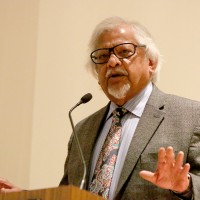
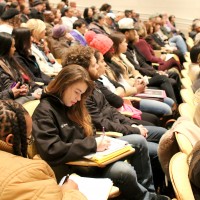
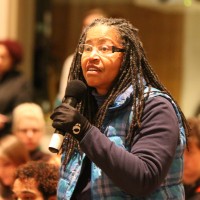
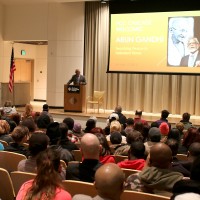
Where does one post questions for public accountability for funding of PCC?
Hi Barbara, at the public hearing on the budget: http://www.pcc.edu/about/administration/budget/notice.html
Arun Gandhi couldn’t get an autograph from his grandfather – Mohandas K. “Mahatma” Gandhi? Wow! Could you imagine if it were today how the world would analyze/dissect his action and call him names. He even made him clean toilets buckets at Gandhi’s ashram, a job which typically were done by the low caste Dalits. If it had happened in our society today he can kiss his grandson good bye to the child protective people. But yet, he turned out pretty good didn’t he. What a way to instill great character in young people.
I would have liked to attend this, but it wasn’t advertised…